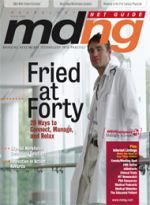Split Personalities: The Amazing Dr. Z
Steven Zuckerman, MD, aka "The Amazing Dr. Z," is a solo-practice neurologist and amateur magician in Baton Rogue, LA. We spoke with Steve to learn how he maintains his medical practice -- and magic!
Steven Zuckerman, MD, aka “The Amazing Dr. Z,” is a solo-practice neurologist and amateur magician in Baton Rogue, LA. We spoke with The Amazing Dr. Z to learn how he maintains his medical practice and his magic skills, as well as how he incorporates magic into his daily practice.
Can you apply any of your skills as a magician to your medical practice, or vice versa? In everyday practice, I always do magic for my patients for fun, and sometimes I do it as a test to see how they’re doing. It’s a great ice breaker and way to make them feel comfortable and to communicate with them on a non-serious/non-professional level.
Would you recommend to other physicians, regardless of specialty, that they get involved with magic? Could it be helpful to their practices? Absolutely. In fact, there’s an excellent book on this called Side-FX that came out about two years ago; some doctors got together with some magicians and came up with a few very simple magic tricks that can be performed using the items in an exam room, like gloves, cotton balls, a stethoscope, or a tongue depressor. Magic is a great thing for physicians to do. The book is geared toward pediatrics, but I designed magic tricks that you can use to do a whole neurological exam. For example, there’s the “paddle trick,” in which you show both sides of a paddle that has a top hat drawn on it and have the patient look at both sides, while you’re watching their eyes move, and all of a sudden, there’s a rabbit coming out of the hat on the paddle. The kids like it, and it keeps their attention, but it enables me to check out their cranial nerves; it’s more fun than watching my finger. Or, I’ll have patients blow on my hand to make a coin disappear, and then they have to reach for the coin with either hand.
How do you find time to practice both medicine and magic? That’s always been a challenge. When I have some time off , I’ll go to a magic convention, or I’ll just sit there and play with cards while I’m talking to patients. They don’t seem to mind too much.
Other than going to conferences, how do you maintain and improve your magic skills? It’s just like anything else; you can get magazines, and you can attend lectures. Once you get to a certain level, you get to know other magicians, and you can talk about what’s current and new.
What opportunities has practicing magic brought about for you? The highlight of my magic career was being invited to perform at George Bush’s first inauguration dinner in Washington, DC. They hired 20 of the world’s best magicians and me to perform at the tables before he gave his talk. The guy who arranged for the magicians to perform is a friend of mine. As a doctor and a magician, you’re a little bit unusual, so you have access to the world’s greatest magicians. So, I befriended one, and when it came time for him to do me a favor, he invited me. I did a trick in which you apparently put a pen through a dollar. Part of the story of the trick is that you say, “This is illegal; do you know why?” And the answer is that you’re not allowed to deface American currency. When I said this, the whole group started laughing, and I didn’t know why. As it turns out, I was performing the trick for the Secretary of the Treasury.
ABCADABRA!
- MAGIC Magazine
- The International Brotherhood of Magicians
- Quick and Easy Card Tricks and Other Magic
